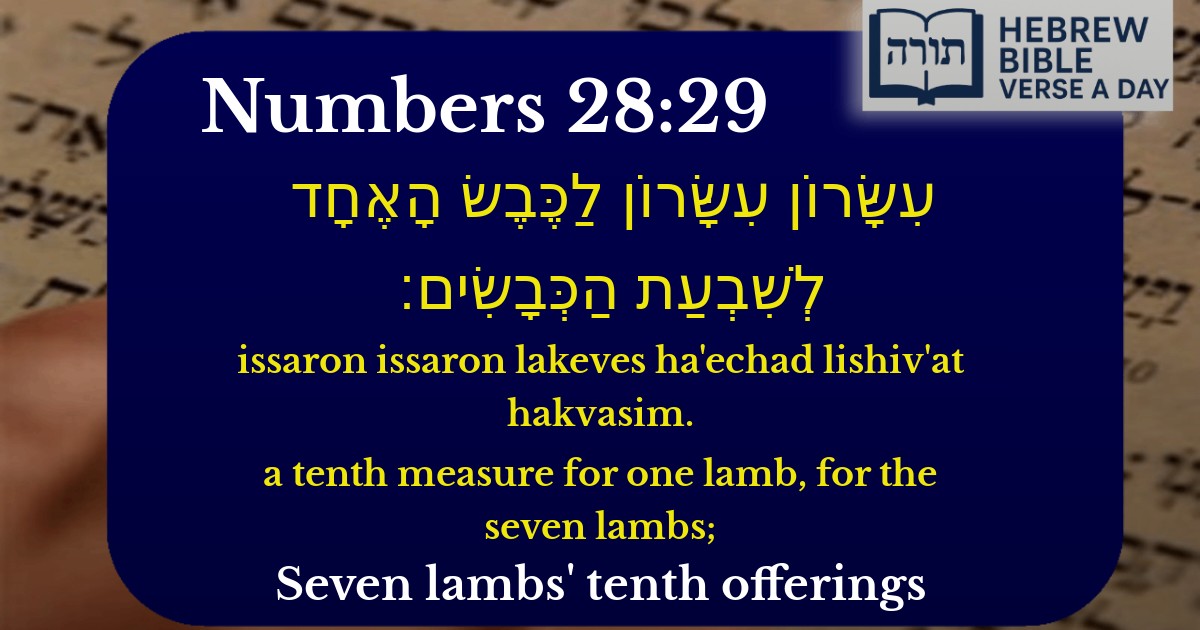Frequently Asked Questions
Q: What does 'a tenth measure for one lamb, for the seven lambs' mean in Numbers 28:29?
A: This verse refers to the grain offering (mincha) brought alongside the daily and additional sacrifices (korbanot) in the Temple. An 'isaron' (tenth measure) of fine flour was required for each lamb offered. Rashi explains that this measurement was consistent whether one lamb or seven lambs were brought, meaning each lamb required its own separate tenth measure of flour.
Q: Why is the 'tenth measure' significant in this verse?
A: The 'tenth measure' (isaron) represents a precise measurement commanded by HaShem for Temple offerings. The Rambam (Hilchos Maaseh Hakorbanos) teaches that exact measurements in sacrifices show our dedication to fulfilling mitzvos with care and precision, honoring the sanctity of the service.
Q: How does Numbers 28:29 apply to Jewish practice today?
A: While we currently lack the Temple, we learn from this verse the importance of precision in mitzvah observance. The Talmud (Menachos 103b) derives from such verses that we should be meticulous in our religious duties, just as the offerings required exact measurements. Today, this applies to careful measurement in mitzvos like challah separation or matzah baking.
Q: What can we learn from the repetition of 'tenth measure' in this verse?
A: The repetition teaches that each lamb required its own separate offering, even when brought together. The Midrash (Bamidbar Rabbah) explains this emphasizes that every mitzvah and offering stands on its own merit. We learn that each good deed we do has individual significance before HaShem.
Q: Why does the Torah specify measurements for sacrifices?
A: The Talmud (Eruvin 3b) teaches that precise measurements in the Torah show that divine service requires both proper intention (kavanah) and proper action. The exact 'tenth measure' teaches us that serving HaShem requires following His commandments precisely, not arbitrarily. This applies to all areas of halacha (Jewish law).


Explanation of the Verse
The verse "עִשָּׂרוֹן עִשָּׂרוֹן לַכֶּבֶשׂ הָאֶחָד לְשִׁבְעַת הַכְּבָשִׂים" (a tenth measure for one lamb, for the seven lambs) appears in the context of the korbanot (sacrificial offerings) in the Torah, specifically regarding the musaf (additional) offerings brought on festivals. This measurement refers to the amount of fine flour (solet) mixed with oil that accompanies each lamb sacrifice.
Rashi's Commentary
Rashi (Bamidbar 28:21) explains that each of the seven lambs offered on Pesach (and other festivals) requires a separate issaron (tenth of an ephah) of fine flour mixed with oil. This emphasizes that even though multiple lambs are offered, each one must have its own accompanying meal offering, demonstrating the individual significance of each sacrifice.
Rambam's Perspective
In Hilchot Temidin u'Musafin (Laws of Continual and Additional Offerings 1:4), the Rambam codifies this halacha, stating that the meal offering for each lamb must be an issaron, as derived from this verse. This underscores the precision required in the Temple service, where measurements and details are strictly observed.
Symbolic Meaning
The Midrash Tanchuma (Emor 14) suggests that the number seven represents completeness in the natural world (e.g., seven days of the week). The seven lambs with their accompanying offerings thus symbolize the sanctification of time and the elevation of the physical world through divine service.
Practical Halachic Implications